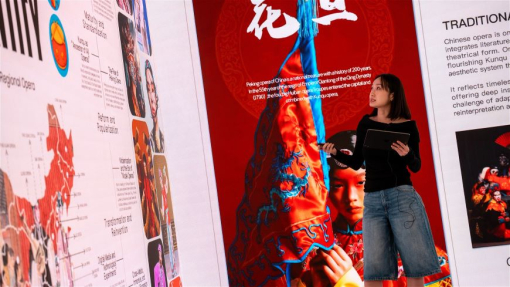Residuum International Conference 2025 Breaks Boundaries with Immersive Format and Global Dialogue in Art and Design
The University of Wales Trinity Saint David (UWTSD) proudly hosted the Residuum International Conference 2025 from May 12 to May 16, at the Fforwm Building, Swansea Waterfront campus and online. This visionary event brought together scholars, artists, and design practitioners from across the globe, including speakers from China, Romania, Africa, Sweden, and the UK, to explore the future of art and design through immersive technology and cross-cultural discussions.

Residuum 2025 transcended traditional conference formats by integrating live-streamed and pre-recorded talks, VR exhibition of student work, and real-time broadcasts from UWTSD’s state-of-the-art immersive room. This hybrid approach challenges the notion of a traditional conferences, combining innovation, accessibility, and global reach.
The conference is a core part of the Professional Doctorate in Art & Design and MA Art & Design programmes at UWTSD, designed as a platform for showcasing research, experimentation, and practice. This year, a deep collaboration with the University’s Digital Experience & Engagement (DE&E) team elevated the event to new heights, with the team playing an integral role in the development and delivery of the immersive format.
“Residuum is not just a conference, it’s a vision of what creative research can become,” said Kylie Boon, Programme Manager Professional Doctorate in Art & Design and MA Art & Design. “Our students and speakers were immersed in an experience that reflects the very essence of our courses, which is future-focused, collaborative, and deeply embedded in digital practice.”
At its core, Residuum exemplifies the Professional Doctorate in Art & Design and MA Art & Design programmes transdisciplinary nature, blending art, design, technology, pedagogy, and research practice to explore new ways of thinking, making, and sharing knowledge.
Over the course of five days, 23 international speakers delivered talks exploring themes like AI and storytelling, immersive imaginations, future heritage, and creative pedagogies.
In parallel, 29 Professional Doctorate in Art & Design and MA Art & Design student presentations were live-streamed from the universities state of the art immersive room, forming a central part of the event, and echoing the courses’ identity. This format, of the students talks transformed the academic delivery into something more dynamic, focused, and engaging. These sessions allowed students to present their research in a setting that felt more like a creative performance or a curated talk, designed for impact and connection, rather than a traditional presentation or talk.
“Compared to conventional presentations, developing an immersive room talk has greatly enhanced my ability to present and communicate research,” said Ruixuan Ruan Professional Doctorate in Art & Design student. “It encouraged deeper reflection on my content and strengthened my skills in organising and synthesising information. I also came to appreciate the wider range of formats available for effective academic communication.”
“The immersive room became a creative stage where students could present their work in a format that matched their ambition,” said Glyn Jenkins, Manager of DE&E. “It’s been a privilege to help reimagine how research is shared, and to support the next generation of creative thinkers.”
This year’s keynote line-up reflected the conference’s commitment to innovation and transdisciplinary dialogue.
- Doris C. Rusch, game designer and founder of The Magic Circle Hut, opened the event with “The Witch’s Way,” exploring the role of somatic storytelling, neuroscience, and digital narrative in designing transformative experiences.
- Dr. Penny Hay, Professor of Imagination at Bath Spa University and Founding Director of House of Imagination, spoke about encounter and creativity in immersive education.
- And Ioana Mischie, transmedia artist, delivered a keynote on visionary storytelling and immersive technology, drawing from her internationally acclaimed work displayed at the prestigious Cannes film festival, and her rich background in professional projects involving VR, and speculative futures.
What’s Next?
Due to its success, the immersive format is set to become a signature feature of the MA and Professional Doctorate programmes. Plans are already underway for Residuum 2026, with continued emphasis on technology-led engagement, research innovation, and cross-border creative exchange.
Dr Mark Cocks Dean of WISA at UWTSD said:
“The Residuum International Conference exemplified our academic aim of providing our students with the knowledge and skills required by the Creative Industries, not just to engage with contemporary technological dialogues but to conceptually question and to creatively push the boundaries of these technologies.
“My congratulations to the students, staff, and visiting speakers for presenting such a fascinating cross-cultural integration of immersive technology and digital innovation that certainly challenged traditional notions of the conference format.”
Further Information
Rebecca Davies
Executive Press and Media Relations Officer
Corporate Communications and PR
Email: rebecca.davies@uwtsd.ac.uk
Phone: 07384 467071
